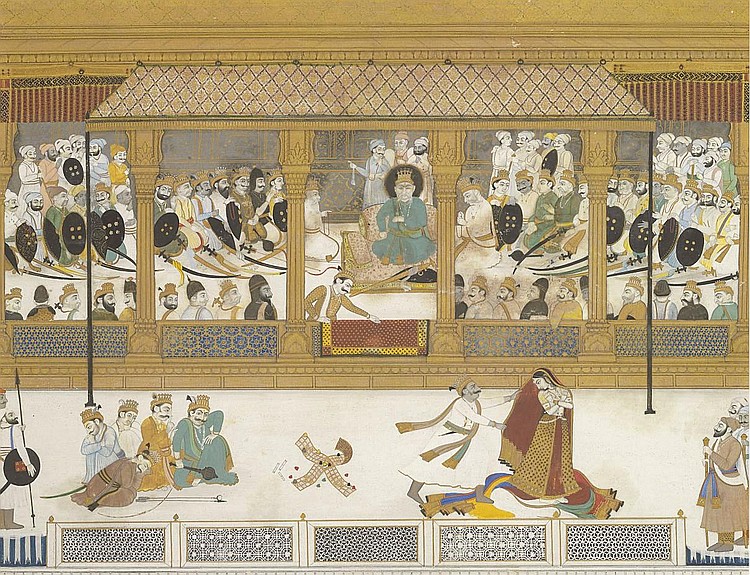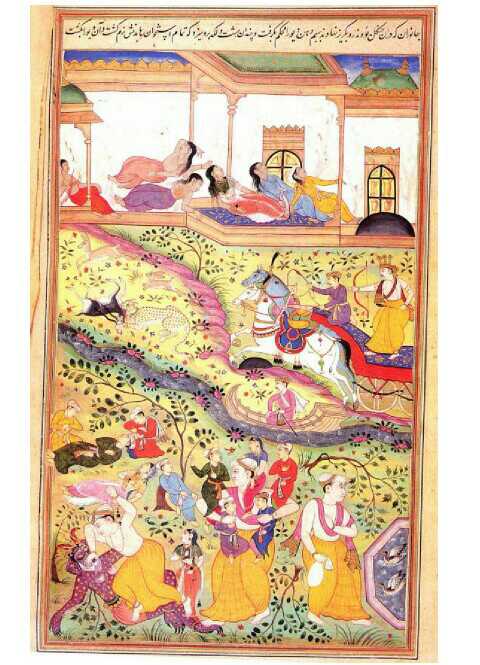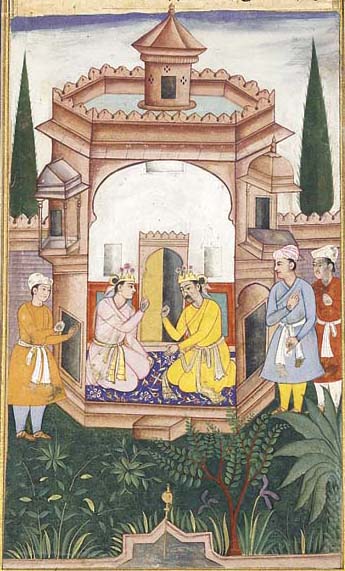|
Vidura
Vidura (), plays a key role in the Hindu epic ''Mahabharata''. He is described as the prime minister of the Kuru kingdom and is the paternal uncle of both the Pandavas and the Kauravas. Legend Mandavya's Curse The rishi Mandavya cursed Yama that he would be born as a maid's son for getting him impaled without a valid reason. He was born in the mortal world as Vidura. Birth and early life Vidura was born through Niyoga between the sage Vyasa and Parishrami, a handmaiden to the queens Ambika and Ambalika. Ambika first mated with Vyasa through the niyoga process but kept her eyes closed during the process because his appearance and power frightened her. As a result she gave birth to the blind Dhritarashtra. Later her sister Ambalika followed the same process with Vyasa, and knew to keep her eyes open. But she was pale with fear during the niyoga, and so gave birth to the albino Pandu. Finally the queens sent their maiden Parishrami in their place, who behaved appropriatel ... [...More Info...] [...Related Items...] OR: [Wikipedia] [Google] [Baidu] |
Yudhishthira
Yudhishthira (Sanskrit: युधिष्ठिर, ud̪ʱiʂʈʰiɾᵊ IAST: ''Yudhiṣṭhira''), also known as Dharmaputra, is the eldest among the five Pandavas, and is also one of the central characters of the ancient Indian epic ''Mahabharata''. He was the king of Indraprastha and later the King of Kuru Kingdom in the epic. Yudhishthira was the son of Kunti, the first wife of King Pandu, fathered by the god Yama due to Pandu's inability to have children. Yudhishthira held a strong belief in ''dharma'' (morals and virtues) and was chosen as the crown prince of Kuru. But after the Lakshagriha incident, he was presumed dead and his cousin Duryodhana was appointed as the new heir. The kingdom was split in half due to a succession dispute between Yudhishthira and Duryodhana. Yudhishthira received the barren half, which he later transformed into the magnificent city of Indraprastha. Yudhishthira and his brothers had a polyandrous marriage with Draupadi, the princess ... [...More Info...] [...Related Items...] OR: [Wikipedia] [Google] [Baidu] |
Characters In The Mahabharata
The '' Mahabharata'' is one of the two major Sanskrit epics of ancient India composed by Veda Vyasa. At its heart lies the epic struggle between the Pandavas and the Kauravas. The central characters include the five Pandava brothers— Yudhishthira, Bhima, Arjuna, Nakula, and Sahadeva—along with their wife Draupadi. On the opposing side, the hundred Kaurava brothers are led by the elder brother, Duryodhana. However, the ''Mahabharata'' is richly populated with other notable figures including Krishna, Bhishma, Drona, Karna, Kunti, Dushasana, Kripa, Dhritrashtra, Gandhari, Shakuni, Ashwatthama, Balarama, Subhadra, Vyasa, Abhimanyu, Pandu, Satyavati and Amba. The ''Mahabharata'' manuscripts exist in numerous versions, wherein the specifics and details of major characters and episodes vary, often significantly. Except for the sections containing the ''Bhagavad Gita'' which is remarkably consistent between the numerous manuscripts, the rest of the epic exists in ... [...More Info...] [...Related Items...] OR: [Wikipedia] [Google] [Baidu] |
Yama (Hinduism)
Yama (), also known as Kāla and Dharmarāja, is the Hindu god of death and justice, responsible for the dispensation of law and punishment of sinners in his abode, Naraka. He is often identified with Dharmadeva, the personification of ''Dharma'', though the two deities have different origins and myths. In Vedic tradition, Yama was considered the first mortal who died and espied the way to the celestial abodes; as a result, he became the ruler of the departed. His role, characteristics, and abode have been expounded in texts such as the ''Upanishads'', the ''Ramayana'', the '' Mahabharata'', and the ''Puranas''. Yama is described as the twin of the goddess Yami, and the son of the god Surya (sun) (in earlier traditions Vivasvat) and Sanjna. He judges the souls of the dead and, depending on their deeds, assigns them to the realm of the Pitris (forefathers), Naraka (hell), or to be reborn on the earth. Yama is one of the Lokapalas (guardians of the realms), appointed as ... [...More Info...] [...Related Items...] OR: [Wikipedia] [Google] [Baidu] |
Dhritarashtra
Dhritarashtra () was a ruler of the ancient Kuru kingdom, featured as a central character in the Hindu epic ''Mahabharata''. He is also attested in the ''Yajurveda'', where he is acknowledged as the son of King Vichitravirya. According to the ''Mahabharata'', Dhritarashtra’s birth was the result of the ancient practice of ''Niyoga''. After Vichitravirya died childless, his half-brother Vyasa fathered children with Vichitravirya’s widows to continue the Kuru lineage. Dhritarashtra was born blind to Vichitravirya’s elder queen, Ambika. Despite being the eldest, his blindness disqualified him from inheriting the throne, which passed to his younger half-brother, Pandu. However, after Pandu renounced the throne and retired to the forest, Dhritarashtra assumed kingship of the Kuru kingdom, albeit as a nominal ruler heavily influenced by his grandsire, Bhishma, and his eldest son, Duryodhana. Dhritarashtra married Gandhari, a devoted wife who, in a gesture of solidarity, ... [...More Info...] [...Related Items...] OR: [Wikipedia] [Google] [Baidu] |
Mahabharata
The ''Mahābhārata'' ( ; , , ) is one of the two major Sanskrit Indian epic poetry, epics of ancient India revered as Smriti texts in Hinduism, the other being the ''Ramayana, Rāmāyaṇa''. It narrates the events and aftermath of the Kurukshetra War, a war of succession between two groups of princely cousins, the Kauravas and the Pandava, Pāṇḍavas. It also contains Hindu philosophy, philosophical and devotional material, such as a discussion of the four "goals of life" or ''puruṣārtha'' (12.161). Among the principal works and stories in the ''Mahābhārata'' are the ''Bhagavad Gita'', the story of Damayanti, the story of Shakuntala, the story of Pururava and Urvashi, the story of Savitri and Satyavan, the story of Kacha (sage), Kacha and Devayani, the story of Rishyasringa and an Ramopakhyana, abbreviated version of the ''Rāmāyaṇa'', often considered as works in their own right. Traditionally, the authorship of the ''Mahābhārata'' is attributed to Vyasa, Vy ... [...More Info...] [...Related Items...] OR: [Wikipedia] [Google] [Baidu] |
Pandava
The Pandavas (Sanskrit: पाण्डव, aɳɖɐʋᵊ IAST: Pāṇḍava) is a group name referring to the five legendary brothers, Yudhishtira, Bhima, Arjuna, Nakula, and Sahadeva, who are central figures of the Hindu epic ''Mahabharata''. They are acknowledged as the sons of Pandu, the King of Kuru, but were fathered by different '' Devas'' (gods) due to Pandu's cursed inability to naturally sire children. In the epic, the Pandavas married Draupadi, the princess of Panchala, and founded the city of Indraprastha after the Kuru Kingdom was split to avoid succession disputes. After the split, the other part of the kingdom was ruled by their cousins, the Kauravas. However, the Pandavas lost their kingdom to Duryodhana (eldest and king of the Kauravas) when Yudhishthira gambled it away during a game of dice. The bet Yudhishtira agreed to was that the Pandavas would hand the kingdom over to the Kauravas and go into exile for 12 followed by an year in hiding. After this ... [...More Info...] [...Related Items...] OR: [Wikipedia] [Google] [Baidu] |
Lakshagraha
Lakshagriha (), also called the House of Lacquer, is a palace made of lacquer featured in the Hindu epic Mahabharata. It is the setting of an assassination plot in the epic, devised by the prince Duryodhana to murder his cousins, the Pandavas, by planning to immolate them while they slept within the palace. Literature Mahabharata Dhritarashtra, the ruler of the Kuru kingdom, designated his nephew and the eldest son of Pandu, Yudhishthira, as the heir-apparent to the throne. Yudhishthira and his four brothers, called the Pandavas, grew popular among the masses, owing to their great deeds and prowess. Threatened by his cousins' fame and stoked by envy, Dhritarashtra's eldest son, Duryodhana, persuaded his father to allow him to plot against them to retain control over the kingdom. Gaining the king's consent, Duryodhana instructed the architect Purochana to build a palace using flammable lacquer, and set it aflame on a designated day to assassinate the sleeping Pandavas and ... [...More Info...] [...Related Items...] OR: [Wikipedia] [Google] [Baidu] |
Duryodhana
Duryodhana (, Help:IPA/Sanskrit, [d̪ʊɾjoːd̪ʱən̪ᵊ], ), also known as Suyodhana, is the primary antagonist in the Hindu epic ''Mahabharata.'' He is the eldest of the Kaurava, Kauravas, the hundred sons of King Dhritarashtra and Queen Gandhari (Mahabharata), Gandhari of Kuru dynasty. Born through a miraculous manner, his birth is accompanied by ill-omens. Duryodhana grows up in Hastinapur, Hastinapura and later becomes its crown prince. Driven by innate selfishness, jealousy, and hostility towards his cousins—the five Pandava brothers—Duryodhana frequently plots against them, aided by his principal allies: his trickster uncle Shakuni, his loyal friend Karna, his devoted brother Dushasana and his blind and indulgent father Dhritarashtra. Duryodhana's envy culminates in the infamous dice game, where he humiliates Draupadi, the queen of the Pandavas. This incident provokes Bhima, the second Pandava, to vow that he will one day smash Duryodhana's thigh. Later, with the he ... [...More Info...] [...Related Items...] OR: [Wikipedia] [Google] [Baidu] |
Bhishma
Bhishma (), also known as Pitamaha, Gangaputra, and Devavrata, is a central figure in the Hindu epic Mahabharata. He was a statesman and military commander of the ancient Kuru Kingdom. Renowned for his wisdom, valor, and unwavering principles, Bhishma served as the supreme commander of the Kaurava forces during the Kurukshetra War. Born to King Shantanu and the river goddess Ganga, he was originally named Devavrata. He was designated the heir-apparent to the throne. However, he renounced his claim and took a vow of lifelong celibacy to facilitate his father's marriage to Satyavati. This unparalleled sacrifice earned him the title Bhishma, meaning "the one who undertakes a severe vow," and he was blessed with ''Ichcha Mrityu''—the boon of choosing his time of death. Bhishma's life after his vow was marked by unwavering loyalty to the Kuru dynasty. He served as the chief advisor and regent to successive rulers of Hastinapura, including his stepbrothers Chitrangada and Vi ... [...More Info...] [...Related Items...] OR: [Wikipedia] [Google] [Baidu] |
Pandu
Pandu () was the king of Kuru kingdom, with capital at Hastinapur in the epic '' Mahabharata''. He was the foster-father of the five Pandavas, who are the central characters of the epic. Pandu was born pale, to Vichitravirya's second wife, Ambalika. Pandu married Kunti and Madri. Following sage Kindama's curse, his sons were born through the boons bestowed upon his wife Kunti by a number of deities, owing to his inability to bear children. Birth When Vichitravirya died due to sickness, Bhishma was unable to ascend the throne because of his vow, and Bahlika's line was unwilling to leave the Bahlika kingdom. There ensued a succession crisis in Hastinapura. Satyavati then invited her son Vyasa to impregnate the queens Ambika and Ambalika under the Niyoga practice. When Vyasa approached Ambalika, she was frightened by his scary appearance, and she had become pale in disgust; hence, her son was born pale. Thus, Pandu's name means pale. Early life Pandu along with ... [...More Info...] [...Related Items...] OR: [Wikipedia] [Google] [Baidu] |
Kurukshetra War
The Kurukshetra War (), also called the Mahabharata War, is a war described in the Hindu Indian epic poetry, epic poem ''Mahabharata'', arising from a dynastic struggle between two groups of cousins, the Kauravas and the Pandavas, for the throne of Hastinapura. The war is used as the context for the dialogues of the ''Bhagavad Gita. Background The ''Mahābhārata'' is an account of the life and deeds of several generations of a ruling dynasty called the Kuru (Hindu mythology), Kuru clan. Central to the epic is an account of a war that took place between two rival families belonging to this clan. Kurukshetra (literally "Kshetram, Region of the Kurus"), also known as Dharmakshetra (the "Region of Dharma"), was the battleground on which the Kurukshetra War was fought. The first ''Mahābhārata'' says that this site was chosen because a sin committed on land was forgiven because of the land's sanctity. The events of the war make up more than a quarter of the ''Mahabharata''. The ... [...More Info...] [...Related Items...] OR: [Wikipedia] [Google] [Baidu] |









